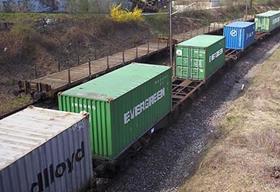
European rail and road transport operator Intercontainer-Interfrigo SA has announced it made a profit of €2.9m last year on total volume carried of 415,800 TEUs, down 3.3 per cent on the previous year's figure.
Celebrating its 40th anniversary in 2007, the company said it had focused on 'continued corporate development and on putting customer benefit first', while at the same time optimising its systems and the range of shuttle and feeder services it offers.
Growth on the group's major east and south-east routes was described as 'substantial' and apparently enabled it to develop its market leader position further, said a spokesman, despite a number of practical difficulties such as infrastructure bottlenecks and strikes.
'The drop in volumes may largely be ascribed to capacity problems in western and northern ports, which had a generally adverse effect on transport quality on routes where Intercontainer volumes are traditionally large,' said the spokesman. 'To prevent slippages in the standards delivered to our customers as far as possible, capacity and train frequency in the western and northern ports were only partly reduced.
At 1,194km, the average distance per TEU was slightly higher than in 2006, in keeping with Intercontainer's strategy of focussing on the longer European corridors or on niches specifically requiring experience of intermodal operations. Further evidence of the effects of this strategy may be seen in the average distance in continental traffic, which rose once again by 2.5 per cent to reach 1,588km per TEU.
Within its core markets of south-east Europe, Switzerland and the CIS, a number of new services and expansion of existing services were successfully introduced in the latter part of the 2007 financial year, the group commented. These included the Sopron–Istanbul block trains, where frequency was raised by an additional train per week to reach six block trains in the west–east direction and four trains in the opposite direction.
Several other shuttle services now also operate more frequently: Mannheim–Sopron increased from one to two weekly round trips; Wanne–Sopron from two to three weekly round trips; Koper–Budapest from five to six weekly round trips; and Rekingen/Frenkendorf–Bremerhaven from three to four weekly round trips.
In addition, a new shuttle train is now in service between Wolfurt and Antwerp and between Wanne (Ruhr area) and Bremerhaven.
'Through close cooperation with key customers and our neutral stance, we have succeeded in creating a climate conducive to attracting new markets and projects through constructive interaction with all the players in the supply chain,' explained Franz Böni, managing director of Intercontainer-Interfrigo SA. 'This momentum has been carried forward into 2008, a year that will be hallmarked by our determination to develop our products still further and remain open to cooperation with clients and partners.'
In addition to the transfer of road haulage traffic to rail and the acquisition of new markets for unaccompanied intermodal transport, Mr Böni said he also expected competition on Europe's growth markets to be fiercer. For him the danger of this trend is that 'insufficient priority will be given to making proper use of resources at ports, terminals, train paths, wagons and so on.'
'By developing its range of services, Intercontainer has, however, cemented its market position on its core markets and can offer flexible intermodal services in a spirit of partnership and cooperation to logistics sector clients, who have often invested heavily in intermodal equipment,' he added.



